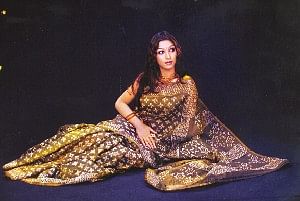Munira's Success Story
Behind the revival of handloom saris
Sadya Afreen Mallick
The Eid Shopping spree is on! The brightly-lit shopping arcades now pulsate with life. Gausia Market, the Bashundhara city, Karnophuli Garden, Concord Tower, Rajlokkhi Complex, The Rifle Square, Navana Tower, Metro Shopping Mall, the Mauchak Market turn into shopper hives.Taking a look at Bailey Road, one finds that during the past few years, it has developed into a popular 'shoppers stop' for deshi saris and other handloom products. Among the attractions is the shop of Munira Emdad, popularly known as the Didi moni of the Tangail sari market. She is one of the women pioneers of our country who has invested years into promoting the deshi sari industry. With limited capital of US Dollars 1,000, Munira gathered some weavers and set up a single roomed outlet at Baily road in 1982. 'It was sometime after liberation, I noticed,' went on Munira, 'the weavers of Tangail and Pabna designed and sold saris at the market. These saris were coarse and inadequate in length. Naturally it failed to attract the ladies with finer taste. 'It was a time when skilled artisans were thinking of shifting from their age-old profession due to falling demand. I decided to gather a handful of weavers and provide them with new ideas and latest designs.' Munira extended her help to buy yarns and materials for better designed saris. Within the last 22 years, the one room store has grown into a multi-storied show room with 50 employees at four branches in Dhaka. A proud owner of Tangail Saree Kutir, she has become an icon in the field of local saris. She has been recreating original designs in cotton saris and other local materials. More than 2,000 weavers and 500 women are directly working under her and engaged in hand embroidery, block prints and other associated work. 'A gorgeous silk Jamdani in subdued colour made specifically for a bridal wear took six months to weave, said Munira. The entire sari is in diagonal floral designs with sachcha(pure) zari work of silver and gold thread. The sari costs about Taka 50,000 and is one of its kind. The order has to be placed well ahead for similar designs, she said. 'New dimensions have been re-created in embroidered Tangail silk sari with karchub work for the fashion frenzied. The Mirpur Katans, Benarasi, silks and pure cotton saris are also available in a wide range of colours and shades. The Muslin, the craft silk in tie-dye, the chand-tara designs in kataan, bring back the feeling of the bygone days. The 'Shwarnalata' design was collected from a sari about 150 years old' said Munira. As Munira puts it, 'following one's dream with commitment reaps rich reward.' With proper guidance, direction in motifs, latest trends in design and materials Tangail saris are now in full bloom in various shades and designs, capturing the hearts of the picky customers. Munira Emdad has gained wide recognition as a successful entrepreneur. Her contribution to our culture has been immense and no doubt a model for other entrepreneurs .
|

Back to the roots in vegetable dye sari |